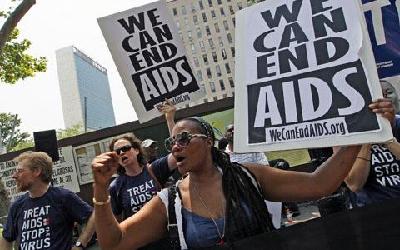
Recent studies have shown that antiretroviral drugs can be used not only to treat HIV, but also to prevent infection in the first place. It's called pre-exposure prophylaxis or PrEP for short. Now, the western US state of California is launching new studies to determine PrEP's effectiveness beyond clinical trials and out in the real world.
Treatment as prevention has been shown to be highly successful in clinical trials. But will it work for people in high risk groups as they go about their daily lives? Will they adhere to the drug regimen even if it's taking only one pill a day?
These are some of the questions the California HIV/AIDS Research Program hopes to answer with three new studies. Mitchell Warren, head of the AIDS advocacy group AVAC, said these are "demonstration studies."
"These are not randomized controlled trials where we're telling people you may get placebo, you may get the active drug. And even if you get the active drug we don't know if it works. These are studies that are going to work with people in communities in California. People who are at risk. [They] are going to be explained that we think this product works based on these clinical trials, but only if you use [it]. And provide it to a small number of people to really better understand the safety and effectiveness in areas outside of clinical trials," he said.
MSM & transgenders
The studies focus on groups where HIV infections are rising rapidly.
Warren said, "All of these activities in California are focused on men who have sex with men and transgender women. And that is entirely understandable and appropriate given the epidemic in the United States. That is the leading area of need. At the same time we really hope as advocates that these demonstration projects in California are the first of many and that many more will look at other populations."
Those taking part in the study are being asked to follow what would appear to be a very simple drug regimen.
"It is a daily dose and it is a combined drug. It's a single pill, but with both active tenofovir and emtricitabine. And it is the same dose that is provided to people who are infected with HIV, who use the same pill for treatment. So the recommendation that was studied in the trial was the same single pill every day," he said.
Daily dose
However, Warren said pre-exposure prophylaxis is only effective if people take the pill. So the studies will also examine why people may skip doses, even if they only have to swallow one pill a day.
"People who took this pill consistently had high levels, an excess of 70 percent reduction of risk. People who didn't take the pill consistently didn't get any benefit at all. There was no added protection," he said.
When antitrovirals first came on the scene in the early and mid-1990s, people had to take dozens of pills a day. They had to take them at very specific times, sometimes with food, sometimes without. They often had very bad side effects, including nausea. There were even conditions called "buffalo hump" and "Crix belly," where body fat would build up behind the neck or on the abdomen. So, while lives were being saved, treatment could make people feel pretty sick.
Warren said it's much different today.
"We also have to remember the incredible scientific advances – from the 80s when getting HIV inevitably meant a very short life and a very painful disease in death – to a period of early antiretroviral therapy where we had drugs that were very difficult to take and very toxic, but they could save your life if you could withstand that – to a point now where people can take one or two pills a day. Much safer, much less toxic. We're in a very different place," he said.
In May, the US Food and Drug Administration will review the PrEP research. It could lead to greater access to prevention as treatment and provide accurate information to healthcare providers, insurance companies and potential users.
placebo: a substance containing no medication and prescribed or given to reinforce a patient's expectation to get well 安慰剂
Better treatment for HIV-positive pregnant women
Much progress, much to do on HIV
New guidelines would help ensure HIV treatment
Hepatitis C kills more Americans than HIV/AIDS
(来源:VOA 编辑:旭燕)
关注和订阅


电话:8610-84883645
传真:8610-84883500
Email: languagetips@chinadaily.com.cn